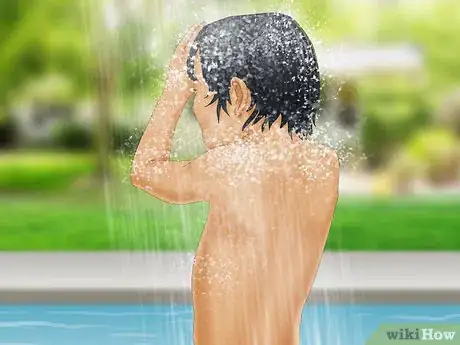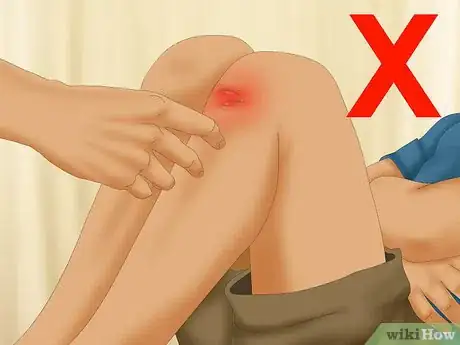This article was medically reviewed by Luba Lee, FNP-BC, MS. Luba Lee, FNP-BC is a Board-Certified Family Nurse Practitioner (FNP) and educator in Tennessee with over a decade of clinical experience. Luba has certifications in Pediatric Advanced Life Support (PALS), Emergency Medicine, Advanced Cardiac Life Support (ACLS), Team Building, and Critical Care Nursing. She received her Master of Science in Nursing (MSN) from the University of Tennessee in 2006.
This article has been viewed 24,521 times.
Many people utilize public pools during the summer in order to beat the heat. Public pools can be full of germs and diseases known as recreational water illnesses.[1] In order to avoid contributing to these illnesses and to help avoid getting them, there are ways to be hygienic in public pools.
Steps
Getting Ready to Get in the Pool
-
1Check pool hygiene. In order to be hygienic at the pool, you first need to make sure the pool is hygienic. Visit your public pool to check the pool inspection results and check the pool's clarity. You can also check the chlorine levels in the pool by bringing your own test kit.
- You can also check all other safety measures while you are at the pool.[2]
-
2Get clean before you get in. When you are going to the pool, you should make sure that you and your family are clean before you get there. This will ensure that you do not spread any germs when you get into the pool. Have every person in your family shower, wash your hair, and rinse really well.
- There should be signs posted at your pool for others to do the same. Look for these posted around the locker room or shower area of the pool.[3]
Advertisement -
3Rinse off after you get out of the pool. Take a shower in the locker room or immediately when you get home. Get the chlorinated water off of your body. You'll also take off other impurities, bacteria, and dead skin cells that can be present even in the cleanest of public pools.
-
4Wear a swimsuit. Do not substitute workout shorts or other athletic gear for a swimsuit. Wearing a real swimsuit is the best way to show respect to other swimmers. It's also unhygienic to get into a swimming pool in anything other than a designated swimsuit.
-
5Wear a swim cap. It will protect your hair from drying out and getting discolored from the chlorine and other chemicals in the pool. It will also keep you from releasing oils, dandruff, and skin particles from your hair and scalp into the pool water.
-
6Stay hydrated before you enter the pool. If you go swimming when you're thirsty, you might be inclined to (even subconsciously) take a few gulps of pool water, which could contain bacteria and make you ill.
-
7Stay out of the pool if you have diarrhea. There are some situations when you should stay out of the pool. If you or anyone in your family has diarrhea, stay out of the pool. This can spread diseases through germs or through fecal matter residue that may be left on the body.
- There is also a chance of an accident in the pool if you are suffering from diarrhea.[4]
-
8Avoid the pool with an open wound. You can also spread germs in the pool if you have an open wound. The residue from the open wound, either pus or blood, may leak into the pool from your wound. Make sure you check the members of your family for open wounds and keep them out of the pool if they have one.[5]
- Wrapping the wound up will not prevent this from happening. The bandage will get wet and get into the pool, so keep your family out if they have any wound.
Practicing Hygiene in the Pool
-
1Forbid urinating in the pool. Urinating in the pool is one of the major ways that residential water illnesses get spread in pools. The urine released into the pool can contain bacteria and interfere with the pH of the pool. No matter how young your family members are, make sure that you explain that there should not be any peeing in the pool.
- Use an age appropriate explanation about why urinating in the pool not to be done. This can be harder to explain to younger children, but try to make it clear. [6]
-
2Take pool breaks. In order to help prevent urinating or pooping in the pool, take a break from the pool once an hour. This will give you time to check and change the diapers on younger children and make your older children to go to the bathroom.
- Make sure you change your children's diapers away from the pool. You don't want to accidentally contaminate the water with germs.[7]
-
3Do not swallow the water. Water is the main way that you can get residential water illnesses. To avoid getting sick, make sure you do not swallow any pool water when you are playing in the pool. It is important to be well hydrated before getting into the pool to avoid swallowing pool water by accident. This can expose you to the bacteria and other germs in the water.
- Make sure you tell your children to avoid doing this as well. Explain to them that the water can make them sick.
- Also avoid opening your eyes underwater. The intense water exposure can cause eye infections from the bacteria or germs.[8]
-
4Use swim appropriate bottoms. If you have young children, they cannot wear normal diapers in the pool. Your child should have swim diapers or swim pants on when they go into the pool to help prevent excrement getting into the pool.
-
5Wear flip flops or sandals to the pool. When you take your family to the pool, make sure you each wear a pair of flips flops or sandals that are easy to put on and take off. Wear them at all times when you're walking around the pool to keep your feet away from any germs, viruses, or bacteria that might cause skin irritations.
- If you don't, it can cause athlete’s foot and warts.
Knowing If You Have a Water-Born Diseases
-
1Recognize the threat of recreational water illnesses (RWIs). Despite being hygienic, you or your family may still develop a recreational water illness (RWI). These conditions develop when you are exposed to fungi, viruses, bacteria, or additional microbes in the water. The most common of these are E. coli, norovirus, and cryptosporidium.
-
2Watch for symptoms of RWIs. There are many different types of RWIs that you can catch from public swimming pools. These may affect your skin, ears, eyes, respiratory system, or gastrointestinal tract. Look for the common symptoms of the RWI illnesses, which are:
- Diarrhea, which develops most often
- Ear infections
- Skin rashes
- Eye and lung irritation
- Upper respiratory infections[13]
-
3Be cautious of different water areas. Public pools are not the only area where you can contract RWIs. Despite the chemicals used in pools, the germs are still prevalent. This is true of any communal water source, so you need to be cautious of any public recreational area. In addition to the pools, other areas to be careful are:
References
- ↑ http://www.cdc.gov/healthywater/swimming/swimmers/rwi.html
- ↑ http://www.cdc.gov/healthywater/swimming/swimmers/steps-healthy-swimming.html
- ↑ http://www.cdc.gov/healthywater/pdf/swimming/resources/share-fun-not-germs-508c.pdf
- ↑ http://www.cdc.gov/healthywater/swimming/swimmers/steps-healthy-swimming.html
- ↑ http://www.cdc.gov/healthywater/swimming/swimmers/steps-healthy-swimming.html
- ↑ http://www.cdc.gov/healthywater/swimming/swimmers/steps-healthy-swimming.html
- ↑ http://www.cdc.gov/healthywater/pdf/swimming/resources/share-fun-not-germs-508c.pdf
- ↑ http://www.cdc.gov/healthywater/pdf/swimming/resources/share-fun-not-germs-508c.pdf
- ↑ http://www.cdc.gov/healthywater/pdf/swimming/resources/share-fun-not-germs-508c.pdf
- ↑ http://www.cdc.gov/healthywater/swimming/swimmers/swim-diapers-swim-pants.html
- ↑ http://www.cdc.gov/healthywater/swimming/swimmers/rwi.html
- ↑ http://www.cdc.gov/healthywater/swimming/swimmers/rwi/other-infections.html
- ↑ http://www.cdc.gov/healthywater/swimming/swimmers/rwi.html
- ↑ http://www.cdc.gov/healthywater/pdf/swimming/resources/share-fun-not-germs-508c.pdf
- ↑ http://www.cdc.gov/healthywater/swimming/swimmers/rwi.html







































































